| Listing 1 - 10 of 23 | << page >> |
Sort by
|
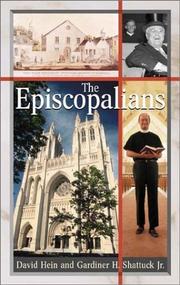
ISBN: 0313229589 Year: 2004 Volume: 11 Publisher: Westport London Praeger
Abstract | Keywords | Export | Availability | Bookmark
 Loading...
Loading...Choose an application
- Reference Manager
- EndNote
- RefWorks (Direct export to RefWorks)
283 <73> --- Anglikaanse Kerk in de USA. Episcopaalse Kerk --- Episcopal Church --- Protestant Episcopal Church in the U.S.A. --- Protestant Episcopal Church in the United States of America --- American Episcopal Church --- Protestant Episcopal Church --- Protestantlich-Bischöfliche Kirche der Vereinigten Staaten --- Protestant Episcopal Church in the Confederate States of America --- 283 <73> Anglikaanse Kerk in de USA. Episcopaalse Kerk --- Episcopal Church. --- Church of England
Periodical
ISSN: 00182486 23775289 Year: 1932 Publisher: Austin, Tex. Church Historical Society
Abstract | Keywords | Export | Availability | Bookmark
 Loading...
Loading...Choose an application
- Reference Manager
- EndNote
- RefWorks (Direct export to RefWorks)
Includes section "Book reviews."
Periodicals --- Christian church history --- Episcopal Church --- Episcopal Church. --- Protestant Episcopal Church in the U.S.A. --- Protestant Episcopal Church in the United States of America --- American Episcopal Church --- Protestant Episcopal Church --- Protestantlich-Bischöfliche Kirche der Vereinigten Staaten --- Protestant Episcopal Church in the Confederate States of America --- Protestantyzm --- Arts and Humanities --- Religion --- Protestantyzm.
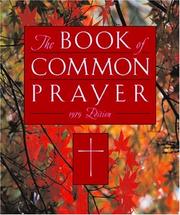
ISBN: 1281529095 9786611529093 0199723915 9780199723911 9780195287714 0195287711 Year: 2005 Publisher: New York : Oxford University Press,
Abstract | Keywords | Export | Availability | Bookmark
 Loading...
Loading...Choose an application
- Reference Manager
- EndNote
- RefWorks (Direct export to RefWorks)
A special occasion merits a memorable gift, and this prayer book is just right for marking such an event. The Deluxe Gift Edition's bindings combine two types of soft-to-the-touch Vivella: one pattern wraps around the book's spine and back cover, while a contrasting pattern is on the front. The result is a stylish package that is sure to be treasured by its recipient. Includes a ribbon marker, Family Record section and attractive gift box.
Hymns, English. --- English hymns --- Fuging tunes --- Fuguing tunes --- Episcopal Church. --- Protestant Episcopal Church in the Confederate States of America --- Protestant Episcopal Church in the U.S.A. --- Protestant Episcopal Church in the United States of America --- American Episcopal Church --- Protestant Episcopal Church --- Protestantlich-Bischöfliche Kirche der Vereinigten Staaten
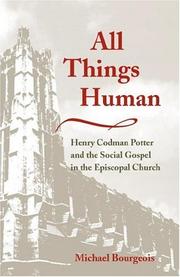
ISBN: 128313554X 9786613135544 0252090578 9780252090578 0252028775 9781283135542 9780252028779 6613135542 Year: 2004 Publisher: Urbana, Ill.
Abstract | Keywords | Export | Availability | Bookmark
 Loading...
Loading...Choose an application
- Reference Manager
- EndNote
- RefWorks (Direct export to RefWorks)
Social gospel. --- Gospel, Social --- Christian sociology --- Potter, Henry Codman, --- Potter, Henry C., --- Episcopal Church --- Protestant Episcopal Church in the Confederate States of America --- Protestant Episcopal Church in the U.S.A. --- Protestant Episcopal Church in the United States of America --- American Episcopal Church --- Protestant Episcopal Church --- Protestantlich-Bischöfliche Kirche der Vereinigten Staaten --- Doctrines --- History.
Book
ISBN: 1469626985 1469628139 9781469628134 9781469626987 9781469626970 1469626977 9798890849595 Year: 2016 Publisher: Chapel Hill
Abstract | Keywords | Export | Availability | Bookmark
 Loading...
Loading...Choose an application
- Reference Manager
- EndNote
- RefWorks (Direct export to RefWorks)
This cultural history of mainline Protestantism and American cities - most notably, New York City - focuses on wealthy, urban Episcopalians and the influential ways they used their money. Peter W. Williams argues that such Episcopalians, many of them the country's most successful industrialists and financiers, left a deep and lasting mark on American urban culture.
Episcopalians --- Anglicans --- History --- Episcopal Church --- Protestant Episcopal Church in the Confederate States of America --- Protestant Episcopal Church in the U.S.A. --- Protestant Episcopal Church in the United States of America --- American Episcopal Church --- Protestant Episcopal Church --- Protestantlich-Bischöfliche Kirche der Vereinigten Staaten --- Influence. --- United States --- Church history
Book
ISBN: 1498224482 9781498224482 9781498224475 1498224474 Year: 2015 Publisher: Eugene, Oregon
Abstract | Keywords | Export | Availability | Bookmark
 Loading...
Loading...Choose an application
- Reference Manager
- EndNote
- RefWorks (Direct export to RefWorks)
Church controversies --- Anglican Communion. --- Episcopal Church. --- Episcopal Church --- Protestant Episcopal Church in the U.S.A. --- Protestant Episcopal Church in the United States of America --- American Episcopal Church --- Protestant Episcopal Church --- Protestantlich-Bischöfliche Kirche der Vereinigten Staaten --- Protestant Episcopal Church in the Confederate States of America --- History
Book
ISBN: 019065645X 0190656476 0190656468 9780190656461 9780190656478 9780190656454 Year: 2017 Publisher: New York, NY
Abstract | Keywords | Export | Availability | Bookmark
 Loading...
Loading...Choose an application
- Reference Manager
- EndNote
- RefWorks (Direct export to RefWorks)
" Throughout her prodigious life, activist and lawyer Pauli Murray systematically fought against all arbitrary distinctions in society, channeling her outrage at the discrimination she faced to make America a more democratic country. In this definitive biography, Rosalind Rosenberg offers a poignant portrait of a figure who played pivotal roles in both the modern civil rights and women's movements. A mixed-race orphan, Murray grew up in segregated North Carolina before escaping to New York, where she attended Hunter College and became a labor activist in the 1930s. When she applied to graduate school at the University of North Carolina, where her white great-great-grandfather had been a trustee, she was rejected because of her race. She went on to graduate first in her class at Howard Law School, only to be rejected for graduate study again at Harvard University this time on account of her sex. Undaunted, Murray forged a singular career in the law. In the 1950s, her legal scholarship helped Thurgood Marshall challenge segregation head-on in the landmark Brown v. Board of Education case. When appointed by Eleanor Roosevelt to the President's Commission on the Status of Women in 1962, she advanced the idea of Jane Crow, arguing that the same reasons used to condemn race discrimination could be used to battle gender discrimination. In 1965, she became the first African American to earn a JSD from Yale Law School and the following year persuaded Betty Friedan to found an NAACP for women, which became NOW. In the early 1970s, Murray provided Ruth Bader Ginsburg with the argument Ginsburg used to persuade the Supreme Court that the Fourteenth Amendment to the Constitution protects not only blacks but also women - and potentially other minority groups - from discrimination. By that time, Murray was a tenured history professor at Brandeis, a position she left to become the first black woman ordained a priest by the Episcopal Church in 1976. Murray accomplished all this while struggling with issues of identity. She believed from childhood she was male and tried unsuccessfully to persuade doctors to give her testosterone. While she would today be identified as transgender, during her lifetime no social movement existed to support this identity. She ultimately used her private feelings of being "in-between" to publicly contend that identities are not fixed, an idea that has powered campaigns for equal rights in the United States for the past half-century. "-- "Euro-African-American activist Pauli Murray was a feminist lawyer who played pivotal roles in both the modern civil rights and women's movements, and later become the first woman ordained a priest by the Episcopal Church. Born in 1910 and identified as female, she believed from childhood that she was male. Jane Crow is her definitive biography, exploring how she engaged the arguments used to challenge race discrimination to battle gender discrimination in the 1960s and 70s. Before there was a social movement to support transgender identity, she mounted attacks on all arbitrary categories of distinction. In the 1950s, her legal scholarship helped Thurgood Marshall to shift his course and attack segregation frontally in Brown v. Board of Education. In the 1960s, Murray persuaded Betty Friedan to help her found an NAACP for women, which Friedan named NOW. Appointed by Eleanor Rossevelt to the President's Commission on the Status of Women in 1962, she advanced the idea of Jane Crow, arguing that the same reasons used to attack race discriminatio n could be used to battle gender discrimination. In the early 1970s, Murray provided Ruth Bader Ginsberg with the argument Ginsberg used to persuade the Supreme Court that the Fourteenth Amendment to the Constitution protects not only blacks but also women--and potentially other minority groups--from discrimination. helping to propel Ruth Bader Ginsberg to her first Supreme Court victory for women's rights and greatly expanding the idea of equality in the process. Murray accomplished all of this as someone who would today be identified as transgender but who, due to the limitations of her time, focused her attention on dismantling systematic injustices of all sorts, transforming the idea of what equality means"--
African American intellectuals --- African American poets --- Murray, Pauli, --- Episcopal Church --- Clergy --- Murray, Anna Pauline, --- Fitzgerald (Family : --- Protestant Episcopal Church in the U.S.A. --- Protestant Episcopal Church in the United States of America --- American Episcopal Church --- Protestant Episcopal Church --- Protestantlich-Bischöfliche Kirche der Vereinigten Staaten --- Protestant Episcopal Church in the Confederate States of America
Book
ISBN: 220401415X 9782204014151 Year: 1979 Publisher: Paris Cerf
Abstract | Keywords | Export | Availability | Bookmark
 Loading...
Loading...Choose an application
- Reference Manager
- EndNote
- RefWorks (Direct export to RefWorks)
Clergy --- Ordination of women --- Biography --- Episcopal Church --- Davies Buell, Susan --- Women, Ordination of --- Ordination --- Women clergy --- Aymard, Paul. --- Davies Buell, Susan. --- Buell, Susan Davies --- Protestant Episcopal Church in the U.S.A. --- Protestant Episcopal Church in the United States of America --- American Episcopal Church --- Protestant Episcopal Church --- Protestantlich-Bischöfliche Kirche der Vereinigten Staaten --- Protestant Episcopal Church in the Confederate States of America --- Biography. --- Clergy - United States - Biography --- Ordination of women - Episcopal Church
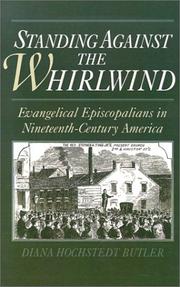
ISBN: 1280442115 0195359054 1423758595 9781423758594 0195085426 9780195085426 0197741290 Year: 1995 Publisher: New York : Oxford University Press,
Abstract | Keywords | Export | Availability | Bookmark
 Loading...
Loading...Choose an application
- Reference Manager
- EndNote
- RefWorks (Direct export to RefWorks)
This study shows that, contrary to common belief, the 19th-century American Episcopal Church contained a large evangelical party that was deeply indebted and closely related to both Anglican and early American interdenominational evangelicalism.
Evangelicalism --- Interdenominational cooperation --- Cooperation, Interchurch --- Cooperation, Interdenominational --- Interchurch cooperation --- Simultaneum --- Christian sects --- Church work --- Evangelical religion --- Protestantism, Evangelical --- Evangelical Revival --- Fundamentalism --- Pietism --- Protestantism --- Episcopal Church --- History --- Protestant Episcopal Church in the Confederate States of America --- Protestant Episcopal Church in the U.S.A. --- Protestant Episcopal Church in the United States of America --- American Episcopal Church --- Protestant Episcopal Church --- Protestantlich-Bischöfliche Kirche der Vereinigten Staaten --- Evangelicalism - Episcopal Church - History - 19th century. --- Interdenominational cooperation - United States - History - 19th century.
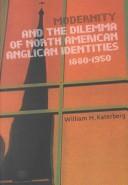
ISBN: 1282859153 9786612859151 0773569030 9780773569034 0773521607 9780773521605 9781282859159 6612859156 Year: 2001 Publisher: Montreal, Que. McGill-Queen's University Press
Abstract | Keywords | Export | Availability | Bookmark
 Loading...
Loading...Choose an application
- Reference Manager
- EndNote
- RefWorks (Direct export to RefWorks)
He describes the life and work of five leaders in the Anglican Church in Canada and the Episcopal Church in the United States who came of age in the late nineteenth century and served their religious communities until the mid-twentieth century. As clergy and educators they hoped to root the faith of modern Anglicans/Episcopalians in past traditions to provide a compelling spiritual purpose and identity for the present and the future. Their attempts to articulate a historical basis for Anglican unity and Christian ecumenism often had contradictory and even sectarian results. Modernity and the Dilemma of North American Anglican Identities, 1880-1950 offers historians and scholars of religion and culture in North America a comparative perspective and a new way to understand how a previous generation looked to the past to address the dilemmas of an uncertain present and future.
Modernism (Christian theology) --- Modernism --- Theology, Doctrinal --- Modernist-fundamentalist controversy --- Anglican Church of Canada. --- Episcopal Church. --- History --- Anglican Church of Canada --- Episcopal Church --- Protestant Episcopal Church in the Confederate States of America --- Protestant Episcopal Church in the U.S.A. --- Protestant Episcopal Church in the United States of America --- American Episcopal Church --- Protestant Episcopal Church --- Protestantlich-Bischöfliche Kirche der Vereinigten Staaten --- Church of England in Canada --- Eglise épiscopale du Canada --- History. --- Clergy
| Listing 1 - 10 of 23 | << page >> |
Sort by
|

 Search
Search Feedback
Feedback About UniCat
About UniCat  Help
Help News
News